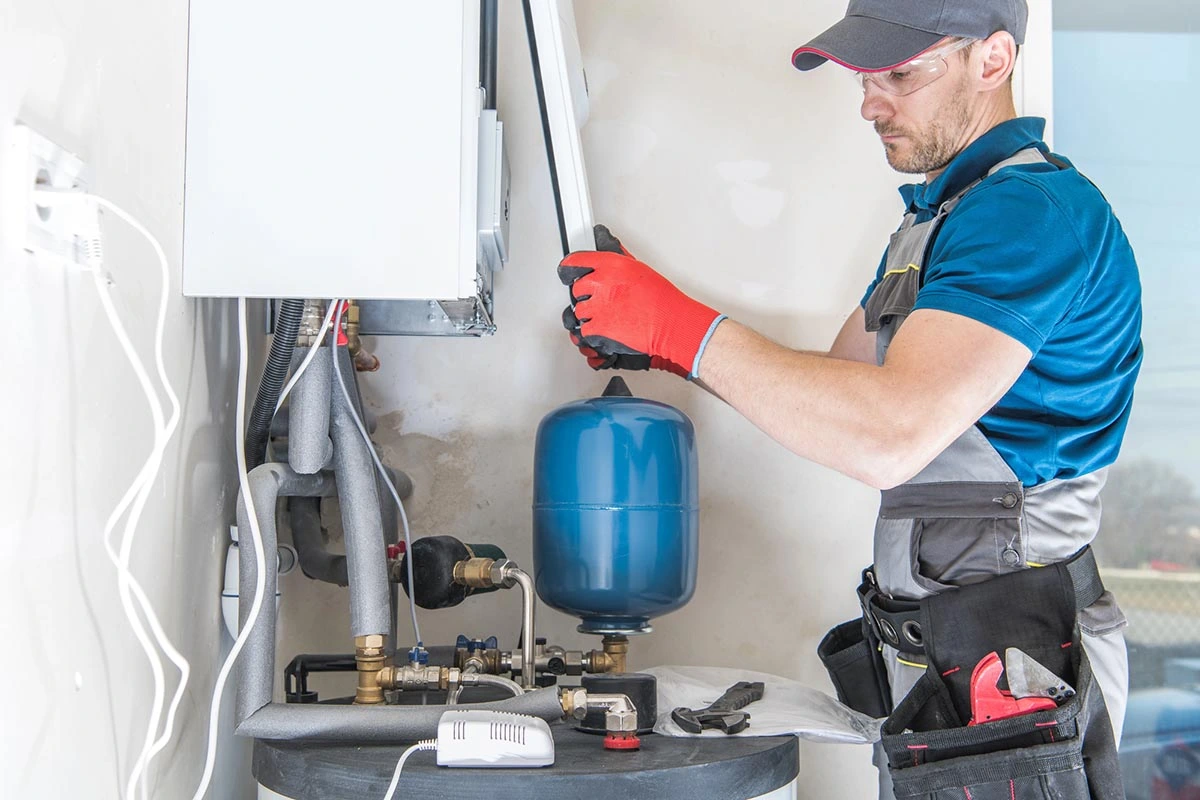When upgrading your boiler, have you considered the pivotal role of your installer in the process? The success of your boiler upgrade hinges largely on the expertise and precision of the installer. A skilled installer doesn’t just provide technical know-how; they are the linchpin ensuring the system operates at peak efficiency, thereby slashing energy bills and curbing your home’s carbon footprint. Explore how an expertly orchestrated installation can transform your home’s energy dynamics and secure long-term performance.
Understanding the Installer’s Role in a Boiler Upgrade
The importance of an installer in a boiler upgrade cannot be overstated. The installer’s role is fundamental to ensuring the efficiency, safety, and longevity of the new system. Their expertise directly influences the success of the installation process. With a well-executed installation, homeowners can expect improved energy efficiency, leading to lower energy bills and a reduced carbon footprint. An installer must possess the necessary skills and knowledge to navigate the complexities of boiler upgrades, ensuring that each component of the system is installed and configured correctly.
- Assessing the property and determining the appropriate boiler size and type
- Ensuring compliance with local regulations and safety standards
- Executing the installation with precision and adherence to manufacturer guidelines
- Conducting thorough testing of the system post-installation
- Providing homeowners with operational guidance and maintenance tips
An installer’s expertise significantly impacts the energy efficiency of a boiler system. By precisely matching the boiler’s output to the property’s needs, the installer can optimise performance and minimise energy consumption. This meticulous attention to detail ensures that the boiler operates at peak efficiency, reducing unnecessary energy waste.
Safety is another area where the installer’s role is critical. A qualified installer implements measures to prevent potential hazards, such as gas leaks or carbon monoxide emissions. Through adherence to safety protocols and regulations, the installer safeguards the household, ensuring a secure and reliable heating system for years to come.
How to Choose a Qualified Installer for Your Boiler Upgrade

Selecting a qualified installer is crucial for a successful boiler upgrade. A competent professional ensures that installations are conducted safely, efficiently, and in compliance with local regulations. This not only impacts the immediate functionality of the system but also its long-term performance and reliability. An installer with the right qualifications and experience can identify the best solutions tailored to your property’s needs, ultimately saving you money through improved energy efficiency and reduced risk of future issues.
A qualified installer should possess relevant certifications and licenses that align with local and national standards. These credentials demonstrate their proficiency in the latest technologies and adherence to safety regulations, which is vital for protecting your home and ensuring the system operates efficiently. Certifications such as Gas Safe registration or being MCS-certified for renewable technologies are essential indicators of a professional’s competence in boiler installations.
When choosing an installer, it’s important to verify their qualifications. This involves checking for up-to-date certifications and licenses, which guarantee that they are authorised to perform boiler installations. Additionally, certified professionals are more likely to be knowledgeable about advanced installation techniques and compliant practices, crucial for modern heating systems.
| Criteria | Importance |
|---|---|
| Certifications and Licenses | Ensures compliance with safety and technical standards |
| Experience | Indicates ability to handle complex installations |
| Reputation | Reflects reliability and quality of service |
| Insurance Coverage | Protects against potential damages during installation |
| References and Reviews | Provide insights into past project success and customer satisfaction |
Evaluating an installer’s reputation and references is another vital step. This can be accomplished by researching their track record, reading customer reviews, and asking for references from previous projects. A strong reputation indicates a history of successful installations and satisfied clients, which is crucial for ensuring a high-quality service. By thoroughly assessing these factors, you can make an informed decision and select an installer who will execute your boiler upgrade with precision and professionalism.
Best Practices for a Successful Boiler Installation
Following best practices in the boiler installation process is crucial for ensuring the system’s long-term efficiency and safety. Proper installation is not just about connecting components; it involves a comprehensive approach that includes detailed planning and execution. By adhering to established best practices, installers can enhance the performance of the heating system, reduce the likelihood of future issues, and extend the overall lifespan of the boiler. This meticulous approach ensures that the installation meets all safety standards and regulations, providing peace of mind to homeowners.
- Conduct a thorough site assessment to determine the specific heating needs of the property
- Precisely size the boiler to match property requirements and ensure optimal performance
- Adhere strictly to manufacturer guidelines and local regulations during installation
- Perform comprehensive system testing post-installation to confirm operational efficiency
- Provide clear operational guidance and maintenance instructions to homeowners
- Implement safety measures to prevent potential hazards, such as gas leaks or carbon monoxide emissions
Poor installation practices can result in a range of issues, including inefficiencies, safety risks, and a reduced system lifespan. Incorrect sizing or improper connections can lead to uneven heating, increased energy consumption, and potential safety hazards. These problems not only affect the comfort and safety of the household but also contribute to higher operational costs and frequent maintenance needs.
Conversely, quality installation ensures that the boiler system operates at peak efficiency, significantly reducing energy bills and environmental impact. Properly installed systems are less prone to breakdowns and require less frequent maintenance, resulting in long-term savings for homeowners. By investing in professional installation services, homeowners can enjoy a reliable, efficient, and safe heating system for years to come.
Ensuring Long-term Performance and Support After Installation

Proper installation is crucial for the long-term performance of a boiler system. What is the impact of a well-installed boiler? A well-installed boiler can prevent premature wear and costly repairs, ensuring that the system operates efficiently for many years. The installer’s expertise in applying precise techniques and adhering to manufacturer guidelines is fundamental to achieving this. By doing so, the boiler system is better positioned to deliver consistent heating while minimizing energy waste. This precision during installation not only safeguards the homeowner’s investment but also contributes to reduced energy bills and a lower carbon footprint.
- Warranties that cover parts and labour, providing peace of mind and financial protection
- Service agreements offering routine maintenance to keep the system running efficiently
- Emergency repair services to address unexpected breakdowns swiftly
- Technical support for troubleshooting and optimising system performance
Post-installation support services, such as warranties and service agreements, play a pivotal role in maintaining the longevity and efficiency of the boiler system. How do these services help? They ensure ongoing support and address any future issues that may arise, providing homeowners with confidence in their heating system’s reliability. Regular maintenance checks, included in many service agreements, help identify potential problems before they escalate into costly repairs. These services not only enhance the boiler’s operational lifespan but also maintain its performance, ensuring that the system continues to meet the household’s heating needs effectively.
Final Words
Achieving a successful boiler upgrade heavily relies on the role of your installer. Installers ensure not only the efficiency but also the safety and longevity of the system. Opting for a qualified installer with relevant certifications assures that the latest technologies and safety regulations are in place.
Prioritising best installation practices and securing post-installation support services further enhance system performance and lifespan. The role of your installer in a successful boiler upgrade is pivotal, enabling energy savings, home comfort, and environmental responsibility, contributing positively to both household economies and ecological impact.
FAQ
Q: What is a boiler installer?
A: A boiler installer is a professional responsible for installing, upgrading, and ensuring the efficient operation of boilers. They must be knowledgeable, certified, and experienced in handling various boiler systems and adhering to safety regulations.
Q: What does installing a new boiler involve?
A: Installing a new boiler involves removing the old system, selecting an appropriate new model, and extensive plumbing and electrical work to integrate the system with the property’s infrastructure. It ensures efficient heating and compliance with safety standards.
Q: Is fitting a new boiler a big job?
A: Fitting a new boiler is a substantial task that requires expertise and time. It includes assessing the property, removing the old unit, installing the new boiler, and checking for efficiency and safety compliance.
Q: How long does it take to upgrade a boiler?
A: Typically, a boiler upgrade can take 1-3 days. This timeline includes the removal of the old unit, installation of the new one, and thorough testing to ensure functionality and safety.
Q: What is the role of an installer in a successful boiler upgrade?
A: The role of an installer in a successful boiler upgrade includes assessing system needs, selecting proper equipment, performing installation, and ensuring system efficiency and safety, directly affecting performance and longevity.
Q: What is the Boiler Upgrade Scheme?
A: The Boiler Upgrade Scheme is a government initiative aimed at promoting energy-efficient heating systems through financial incentives. It encourages homeowners to upgrade outdated boilers, reducing energy consumption and enhancing environmental sustainability.
Q: What is the guidance for property owners in the Boiler Upgrade Scheme?
A: The guidance for property owners in the Boiler Upgrade Scheme includes understanding eligibility, selecting qualified installers, and following application processes to access financial incentives offered for upgrading boiler systems.
Q: What are the Boiler Upgrade Scheme regulations?
A: Boiler Upgrade Scheme regulations specify eligibility criteria, approved technologies, and installer certification requirements, ensuring safe and effective implementation of energy-efficient upgrades in compliance with governmental standards.

